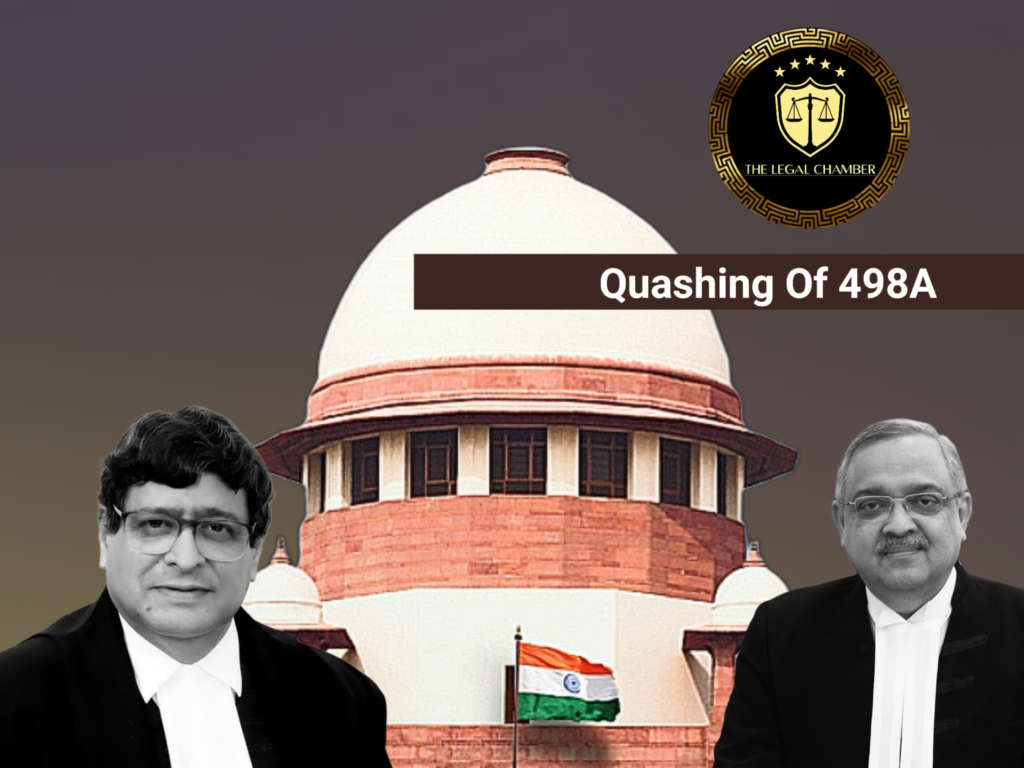
The Supreme Court dismissed a Special Leave Petition challenging the High Court’s quashing of criminal proceedings under Sections 498A, 325, 506 IPC and Dowry Prohibition Act. The Court upheld the invocation of Section 482 CrPC, finding the complaint contained material inconsistencies and amounted to an abuse of process, while emphasizing the need for cautious scrutiny of matrimonial cases involving extended family members. The judgment reaffirmed judicial discretion to prevent misuse of criminal proceedings in family disputes.
Facts Of The Case:
The petitioner, Disha Kapoor, filed a criminal complaint under Section 156(3) CrPC against her husband and nine relatives, including in-laws and extended family members, alleging offenses under Sections 498A (cruelty), 325 (voluntarily causing grievous hurt), 506 (criminal intimidation) IPC and Sections 3/4 of the Dowry Prohibition Act. The complaint alleged harassment and dowry demands of ₹50 lakhs and a Fortuner car after her grandfather-in-law’s death. The Magistrate initially issued summons only against her husband and parents-in-law, relying on Geeta Mehrotra case principles. The Allahabad High Court subsequently quashed the entire proceeding under Section 482 CrPC, noting material contradictions between the complaint and statements recorded under Sections 200/202 CrPC. The petitioner approached the Supreme Court challenging this quashing.
The Court observed glaring inconsistencies: while alleging physical violence (including a fracture) and expulsion from the matrimonial home in September 2020, the petitioner admitted receiving ₹50,000 from her husband in October 2020 for festive purchases and had filed for restitution of conjugal rights. Noting the absence of medical evidence for alleged injuries and shifting narratives about the harassment, the Supreme Court upheld the quashing, finding the proceedings manifestly an abuse of process. The judgment reaffirmed judicial responsibility to prevent misuse of criminal machinery in matrimonial disputes.
Procedural History:
The case originated when the petitioner filed a complaint under Section 156(3) CrPC before the Additional Chief Judicial Magistrate, Lucknow, alleging dowry harassment against her husband and nine family members (Complaint Case No.9780 of 2022). The Magistrate, noting contradictions in the complaint and statements under Sections 200/202 CrPC, issued summons only against the husband and parents-in-law on 08.11.2023, relying on Geeta Mehrotra v. State of UP. The aggrieved respondents (husband and relatives) then approached the Allahabad High Court under Section 482 CrPC seeking quashing of proceedings.
The High Court, applying Preeti Gupta v. State of Jharkhand, quashed the entire proceeding on 20.02.2024, holding it an abuse of process due to material inconsistencies and unjustified implication of extended family. The petitioner challenged this before the Supreme Court via Special Leave Petition (Crl.) No.4485 of 2024. After hearing arguments and attempting settlement, the Supreme Court dismissed the SLP on 08.05.2025, upholding the High Court’s exercise of inherent powers under Section 482 CrPC to prevent misuse of criminal process in matrimonial disputes. The judgment reinforced judicial caution against roping in distant relatives without specific allegations in dowry cases.
Court Observation:
The Supreme Court made several critical observations while dismissing the Special Leave Petition. It noted glaring inconsistencies between the petitioner’s complaint under Section 156(3) CrPC and her subsequent statements recorded under Sections 200/202 CrPC, particularly regarding alleged incidents of violence, dowry demands, and her expulsion from the matrimonial home. The Court emphasized that while the initial complaint implicated ten family members, the allegations against most respondents were vague and unsupported by specific evidence, making their implication unjustified.
The judgment reaffirmed the principles laid down in Geeta Mehrotra and Preeti Gupta, cautioning against the mechanical invocation of Section 498A IPC against extended family members without concrete proof of their involvement. The Court observed that the petitioner’s conduct—such as filing for restitution of conjugal rights while alleging severe harassment—undermined her claims. Additionally, the absence of medical evidence to substantiate her alleged injuries further weakened her case.
The Court upheld the High Court’s use of inherent powers under Section 482 CrPC to quash proceedings, stressing that criminal machinery must not be weaponized in matrimonial disputes. It reiterated that courts must scrutinize such complaints meticulously to prevent abuse of process while ensuring genuine victims are not deprived of justice. The dismissal reinforced judicial discretion to intervene where proceedings are manifestly frivolous or malicious.
Final Decision & Judgement:
The Supreme Court dismissed the Special Leave Petition (Crl.) No. 4485 of 2024, upholding the Allahabad High Court’s judgment that quashed the criminal proceedings against the respondents under Section 482 CrPC. The Court concurred with the High Court’s finding that the petitioner’s complaint contained material inconsistencies and unsubstantiated allegations, particularly regarding the involvement of extended family members. Emphasizing the principles laid down in Geeta Mehrotra and Preeti Gupta, the judgment reaffirmed that roping in relatives without specific allegations of dowry harassment amounts to an abuse of the legal process.
The Court noted the petitioner’s contradictory stands, including her claim of severe harassment while simultaneously seeking restitution of conjugal rights, as well as the lack of medical evidence to support her allegations of physical violence. Declining to interfere with the High Court’s exercise of inherent powers, the Supreme Court held that the proceedings were manifestly frivolous and oppressive. The dismissal reinforced judicial responsibility to prevent misuse of criminal machinery in matrimonial disputes while balancing the rights of genuine victims. All pending applications, if any, were disposed of accordingly.
Case Details:
Case Title: Disha Kapoor vs. State of Uttar Pradesh & Ors. Citation: *2025 INSC 649* (Non-Reportable) Criminal Appeal No.: Special Leave Petition (Crl.) No. 4485 of 2024 Date of Judgment: May 08, 2025 Judges/Justice Name: Hon’ble Mr. Justice K. Vinod Chandran & Hon’ble Mr. Justice Sudhanshu Dhulia
Download The Judgement Here